It can be both annoying and hazardous when your car suddenly stops running while you’re on the road. You’ve probably experienced this issue multiple times, and it’s important to figure out what’s causing it so you can resolve it permanently.
This article is designed to shed light on seven common reasons why your car shuts off while driving and provide you with practical solutions on how to fix them. Buckle up; let’s dive into the world of automotive mysteries and their resolutions!
7 Reasons Why Your Car Shuts Off While Driving
There are various reasons why a car shuts down while driving, ranging from minor to serious issues, seven of them are discussed here.
Your alternator belt has broken
The importance of the car alternator is often overlooked until it breaks down, even though it’s essential. It can be compared to your car’s personal power plant, quietly working under the hood to keep your battery charged while you concentrate on driving.
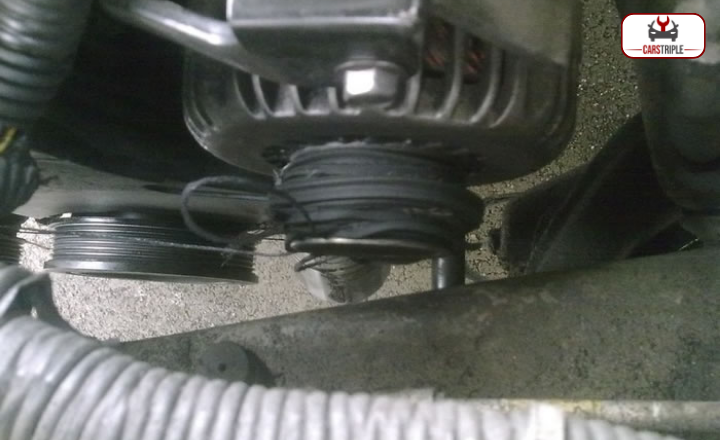
But what happens when this unappreciated hero needs a break? A broken alternator belt can stop this ‘power magician’ from providing constant energy. If your car’s alternator stops working, it’s not just the battery charger you lose. The car also can’t power all the electronic parts that make driving fun instead of just a task.
Causes
Age
Old cars can have hidden problems under the hood. One common issue is with the alternator belt, an important part of your car’s engine. It can wear out after many years of use. There’s a good chance this part, which often gets forgotten, is about to break. It works fine until one day it breaks in the middle of a trip because it’s worn out or cracked.
This can cause an unexpected problem on the side of the road. Trying to keep your car parts from wearing out by not using them might actually make them wear out faster. This problem doesn’t just affect the alternator belt; every electronic part in your car feels the strain.
These parts get worn out when they’re always working hard without getting breaks and recharges from longer drives. Over time, this can add up to more damage, making these parts less effective and shorter-lived.
How to fix it
Every driver who cares about safety and convenience should get a new alternator belt and install it quickly. This can prevent sudden stops and dangers. If you don’t change this important part , then your car shuts off while driving. You might also have to pay a lot of money for repairs later on. It’s better to change the alternator belt early. This is a good investment because it keeps you safe while driving and helps your car last longer.
Your air filter is clogged
The air filter might not seem like a big deal, but it’s super important. It works to clean the air that your engine needs to burn fuel. This makes sure your car runs smoothly and efficiently. When you take good care of your air filter, it helps your fuel burn completely and makes the right amount of exhaust gas. This helps everything in your car work better.
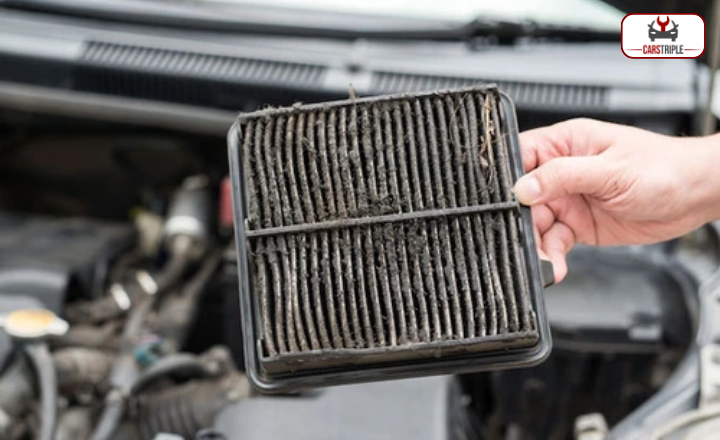
But if you don’t take care of your air filter, it can get clogged up with stuff like dust or dirt. These little particles can get into your engine and mess up the airflow that’s needed for burning fuel inside the engine. This could make your car suddenly stop while you’re driving. These tiny intruders can also cause bigger problems over time, like making you use more fuel or even damaging your engine.
Causes
Dust and dirt
Dust and debris can block your car’s air supply, which can really mess with how well your car runs. Dirty filters can cause problems like bad combustion and even make the cylinders misfire – it’s like your car is quietly coughing and spluttering.
Not taking care of your air filters regularly can shorten the life of your vehicle and make it less energy efficient, which means you won’t enjoy driving as much.
Poor maintenance
If your car’s air filter isn’t working properly, it can cause serious issues. One of these could be your car suddenly stopping while you’re driving. It’s important to fix even small issues like this quickly.
It’s always easier to stop a problem from happening than to fix it later! Learn about how to keep your car in good condition. This will help you have smooth drives and make your car last longer.
How to fix it
Regular car maintenance, like changing your air filter, can help your engine last longer and perform better. This is because a clean air filter allows oxygen to reach the engine easily, making your car run smoothly and reducing unexpected problems during your journey.
Most car makers suggest replacing the air filter every 90 days or after 30,000 miles. Doing this not only makes the engine more reliable but also improves fuel efficiency. Having a professional mechanic do these jobs can help avoid complications or accidents that could lead to costly repairs or personal injuries.
These experts know all about different types of cars which ensures they do the job correctly and carefully. Changing your car’s air filter might not seem important, but it actually has a big impact. It helps maintain regular airflow to your engine and makes your driving experience better.
Your MAF sensor has failed
Your car’s Mass Air Flow (MAF) sensor might not be something you think about often, but it’s really important for your vehicle to run smoothly. This little gadget has a big job – figuring out the best blend of fuel and air for your engine.
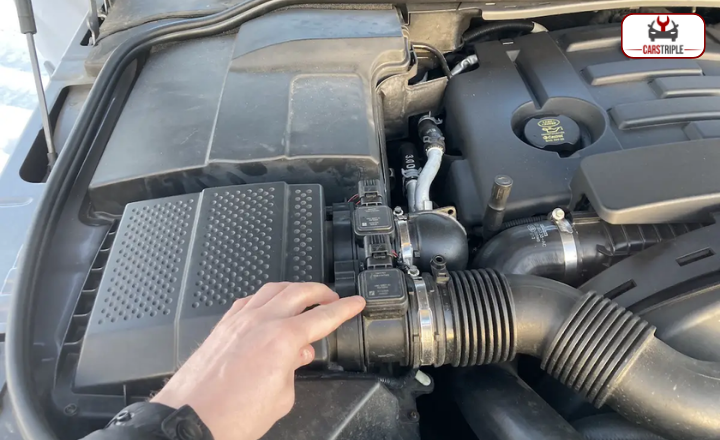
It does this by checking how much air is going into the engine, which then helps manage things like fuel injection and ignition timing. But things can go wrong when the MAF sensor doesn’t work right. Imagine that you’re cruising on the highway and all of a sudden, your car shuts off while driving.
This can happen when a broken MAF sensor gives wrong air input values to your engine management system, messing up the air-fuel mix.
Causes
Defective part
Your car’s Mass AirFlow (MAF) sensor works like human lungs. Even a small crack or flaw in this delicate part can cause big problems, similar to breathing dirty air. Dust particles can get into these cracks, block them and mess up the whole system.
This leads to fewer miles per gallon and a noticeable loss of power, especially on highways. To explain further, when your MAF sensor reads too much airflow due to dirt or damage, it tells your car’s computer that it needs more fuel – causing lower fuel efficiency.
Misalignment
The performance of the Mass Airflow (MAF) sensor is greatly influenced by its alignment. This isn’t a small thing – it can be quite dangerous if ignored. If the sensors don’t align properly, air can sneak beyond the normal routes. This can cause the MAF sensor to overheat due to too much exposure.
Hot weather can harm your car’s MAF sensor. This can change how your car works when you drive. Your car shuts off while driving without warning. This could make it turn off suddenly.
This is not good if you’re on a long drive or going to work! So, it’s crucial to sort this out quickly. Doing this will stop these problems and ensure your journey is calm and stress-free!
How to fix it
A seasoned technician can best handle your MAF sensor issues. This isn’t just a simple inspection but a thorough check for cracks that could let dust particles into the system. A misaligned sensor, although not obvious, can seriously affect your vehicle’s performance.
Only an expert can spot these problems before they get worse. Mishandling these delicate sensors could make existing problems worse and cause malfunctions that might not be immediately noticeable or identifiable by an inexperienced person.
Therefore, it’s both beneficial and cost-saving to leave your vehicle in the hands of professionals who know their job well and provide solutions instead of creating more problems. You might find online repair manuals for your specific vehicle that guide you on fixing a faulty MAF sensor yourself, but getting professional help for such tasks is highly recommended.
You have a defective spark plug or a misfiring ignition coil
You might be shocked to learn that a common cause of unexpected car shutdowns while driving is faulty spark plugs and coils. These tiny parts play a big role in your car’s overall function, but people often forget about them.
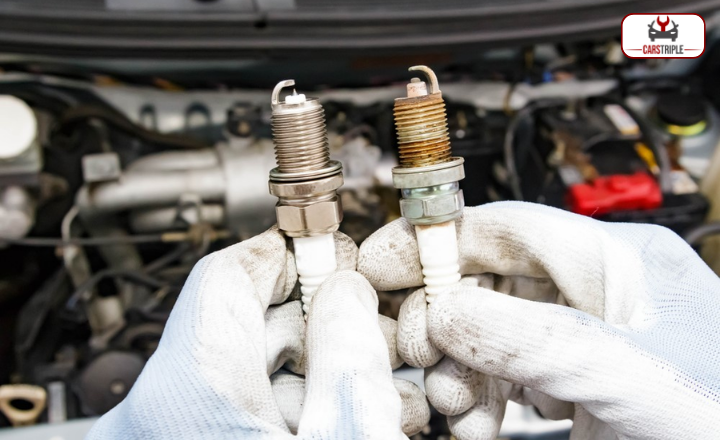
They’re like the director of a beautiful orchestra, making sure electricity flows through them at just the right level to create strong sparks for ignition. Mistakes by these small directors can cause their sparks to become less powerful. This results in the engine cylinders not burning fully.
This can make you spend more money on gas and risk breaking down on the side of the road, which can disrupt your trip and add extra stress to your day!
Causes
Age
Spark plugs and coils can wear out over time. This wear and tear can cause permanent damage, making them weak. This weakness can lead to big problems like disruptions in the car’s ignition process, which usually ensures a smooth ride.
A common problem is misfiring. This happens when the spark plugs don’t light up the fuel-air mix in your car’s combustion chamber properly. When this happens, your car might suddenly lose power while you’re driving. This can put you in a dangerous situation that could be a serious risk to your safety.
Faulty parts
New spark plugs taking over from old ones get power from the ignition coil one by one, not two at a time. This change can lead to uneven performance. The process messes up the usual timing of your engine, disrupting its well-tuned balance.
Improperly seated valves
Car problems often miss one important area – spark plug threads not lining up properly. This issue may seem small but it can cause big problems. It can mess up key ignition steps needed to start the engine or keep it running.
How to fix it
If you are skilled at fixing cars, you can save money and time. But you need to fix things like spark plugs right to avoid problems later on. Luckily, we live in a digital age with plenty of online help. You can find guides and tutorials that give step-by-step instructions for your exact car type.
Learning to change your own spark plugs can change how you think about car upkeep and save you money. But remember, doing it yourself is great but having a skilled mechanic helps ensure the job is done right. Professionals usually follow strict rules for these jobs because they’ve worked on lots of different cars over the years.
Your car is overheating
Your car might not start or act weirdly sometimes. This could happen because of too much pressure in the engine’s cylinders. This pressure comes from too much friction of the moving parts inside the engine.
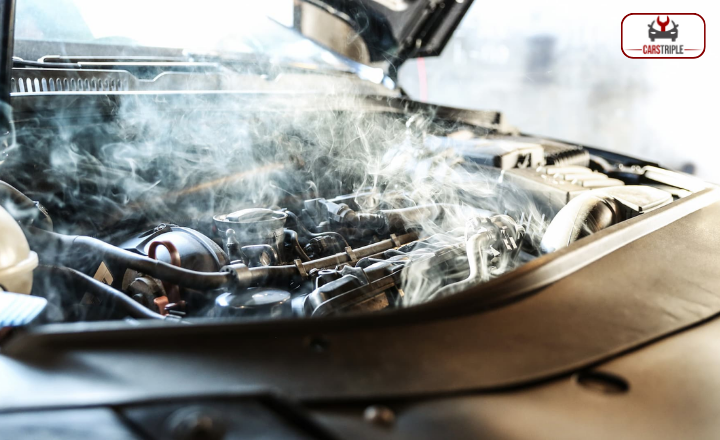
This isn’t normal and it causes a lot of heat. Over time, this heat can cause damage and could even lead to your car breaking down suddenly. To protect your car from expensive damages and to keep you safe, it’s best to turn off your car quickly when this happens.
Always be on the lookout for signs that something is wrong, like strange noises or odd behavior from your car. Acting fast is really important when you notice these signs.
Causes
Hot cylinders in a car engine can cause many problems, mostly due to high pressure. This problem is usually caused by low oil levels in the car’s motor or issues with parts like the fan belts. These problems can harm the water pump and stop it from moving coolant liquid.
This causes hot steam and pressure to build up inside your car’s system. Not having enough coolant liquid to control temperature can cause this serious problem that needs quick professional help.
How to fix it
Fixing a broken fan belt or a worn-out water pump could be the key to keeping your car running. Even though these parts may seem small, looking after them is crucial for your car to run smoothly. Making sure you replace these parts on time can greatly lower the chance of your car suddenly overheating.
This means you can avoid breaking down while driving and having to pay for costly repairs. It’s also very important to keep an eye on the cooling system. This helps your engine run smoothly by keeping it at the right temperature. Checking the coolant fluid levels regularly and topping it up when needed can stop major engine problems from happening.
Poor battery health
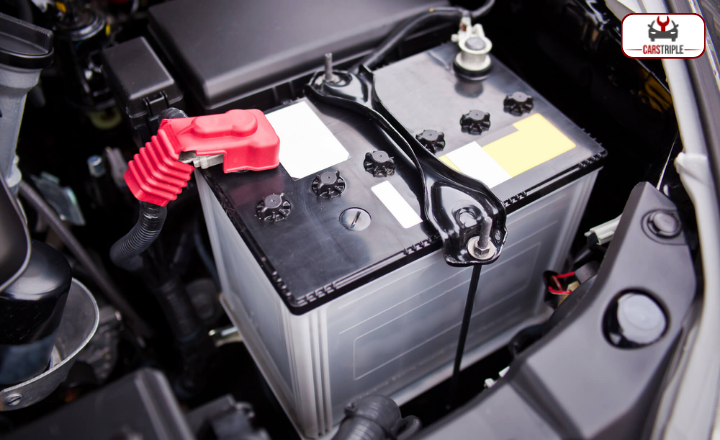
Poor or aged car batteries are also one of the causes that people often overlook. The battery doesn’t only start your car, it’s similar to the heart of your vehicle. It sends energy through its circuits and runs important parts of your engine, not just the ignition.
Causes
Age
Batteries don’t last forever, a fact that people often forget. You wouldn’t want your battery to die unexpectedly during a road trip! Batteries are smartly built, but after being used for a long time, their cells start to break down naturally. This process slowly affects the battery’s performance and lifespan, leading to annoying disruptions. So, it’s smart to change old batteries quickly.
Faulty battery
A bad battery can be a hidden threat that you might not notice until it’s too late. Suddenly your car shuts off while driving, which is already a big hassle. But the problems don’t end there.
This can put too much pressure on your car’s electric system and damage important parts, making repair costs go up a lot. It’s worth it to buy a good quality battery.
How to fix it
The lifespan of your car can depend on how well you take care of its battery. Just jump-starting or charging the battery when it dies isn’t enough. You also need to pay attention to its overall health and condition.
Signs like constant overheating, a slow starting engine, or uneven power could mean that you need a new battery. Getting a new battery can solve these problems for good and keep your car running smoothly.
Faulty fuel pump
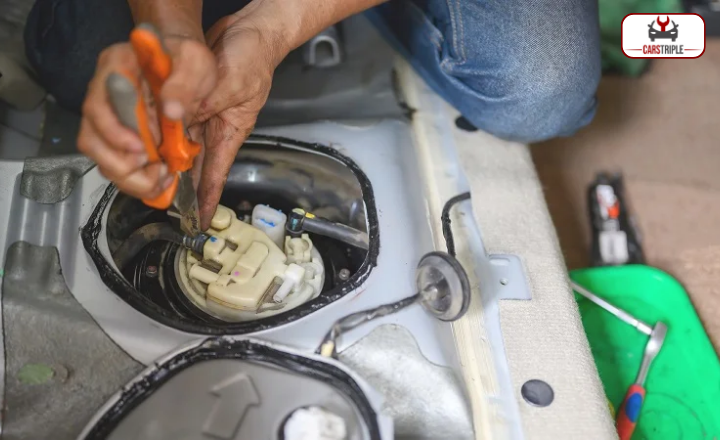
If your fuel pump isn’t working properly, it’s like a ticking time bomb. Your car could stop working at any moment. The problem comes from not having enough pressure to push the fuel into the engine because the fuel pump is broken. This hidden problem can ruin your travel plans and make it very hard to get your car started again.
Causes
Your car’s fuel, which is essential for its operation, can also lead to its damage. This happens especially when things like rust and dirt get into the fuel system. These harmful elements can quickly wear out pump parts and reduce their performance.
How to fix it
Keep your car’s fuel inlet pipe clean all the time to avoid problems down the line. Replacing a broken part with a new one can help stop serious harm to your car’s electrical systems over time.
Don’t try to fix this problem yourself unless you really know what you’re doing. Always get a professional to check out your fuel pump if you think there might be a problem. They have the right tools to spot issues early before they turn into big problems that need major repairs.
Don’t try to open or clean your fuel pump by yourself – it could end up costing you more if something goes wrong. Not sure about the quality of your car’s fuel pump? Choose top-quality replacements to fix this problem for good and ensure reliable performance under normal conditions over time.
Can A Bad Battery Cause A Car To Shut Off While Driving?
Yes, a poor battery can definitely make a car stop during a drive. The battery gives the electric power that the car needs to run. This includes giving power to all electric systems like your lights, radio, and the system that starts your car.
When the battery isn’t working well or can’t give enough power, these systems might not work right or might stop working completely.
Why Does My Car Keep Cutting Off When I Stop?
Your car might be cutting off when you stop due to a few reasons.
No Fuel
Often, one of the main reasons we run into problems is simply forgetting to fill up our car’s gas tank. This common mistake can leave us stuck without any fuel. Sometimes, it’s not as simple as that. Other hidden factors can also leave us with an empty tank.
For example, the fuel gauge in your car might not be working correctly and give wrong readings. This can cause confusion because you might think you still have gas when you don’t. This mistake could lead to unexpected problems when your tank is empty sooner than the fuel gauge showed.
Battery Is Dead Or Alternator Issue
Your car’s alternator has a crucial job – it recharges the battery. When your engine is running, it also powers the alternator which keeps topping up your battery. This means that for your car to work properly, both the alternator and battery need to be in good shape.
Regular checks and maintenance of these two parts are very important because they depend on each other to function well in your car’s system. Don’t worry too much if your alternator breaks or gets damaged while you’re driving.
Your car can still run for a short time on just the energy stored in your battery. But remember, this won’t last forever; eventually, without an alternator working, your car will use up all its backup power and stop running.
Spark Plug Spoiled
All kinds of vehicles, like cars, trucks, and SUVs have a set number of spark plugs. These spark plugs start the ignition process by making a tiny spark. This spark lights up the air fuel mixture in each cylinder. The resulting combustion powers the pistons and gets your vehicle moving.
Sometimes, many spark plugs can get damaged or wear out over time because they’re used a lot or not taken care of properly. Just because your car has a few damaged spark plugs, it doesn’t necessarily mean it will break down immediately. Your vehicle can still function and continue to run despite these issues.
Overheat Of Engine
Not checking your radiator water level regularly can cause big issues for you and your car. This lack of maintenance can make the car’s engine get too hot because there isn’t enough coolant. The engine might have to work too hard, which could damage it badly or even make it break down completely.
Can Low Oil Cause A Car To Shut Off?
Yes, a car can stop running because of low oil levels. Your car needs oil to keep the engine and its parts smooth. Too little oil can cause too much rubbing between these parts. This can make them get too hot and might even break the engine.
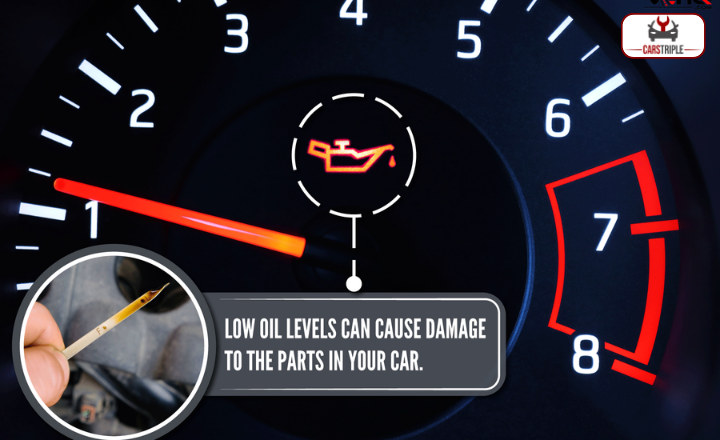
To keep this from happening, your car might stop itself. Also, low oil levels could make the oil pressure drop a lot. This could set off the car’s safety system and it would turn off the engine to stop any harm from happening.
Conclusion
There are several reasons why your car shuts off while driving, including issues with the fuel system, ignition switch, alternator, sensor problems, and even engine failure. Each of these problems requires distinct troubleshooting methods and possible professional intervention.
It is crucial to be aware of these potential problems to prevent dangerous situations on the road. Regularly servicing your car can help detect any underlying issues early and fix them before they cause more serious damage. Remember, safety should always come first; never ignore unusual signs from your vehicle and seek help when necessary.
FAQ’s
What should I do if my ignition switch is causing my car to shut off?
If your ignition switch is faulty, you’ll need professional help for replacement as incorrect installation can lead to further damage.
Is there any connection between sensor failures and cars shutting down during drives?
Yes! Malfunctioning sensors like crankshaft position sensor or camshaft position sensor can hamper communication with the engine control unit (ECU) causing your car to shut down.
Read More:
